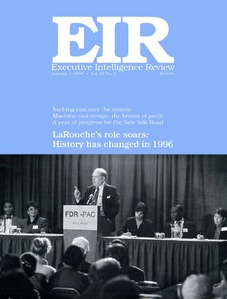Strategic Outlook
Nothing can save the current system
by Lyndon H. LaRouche, Jr.
Lyndon H. LaRouche’s keynote address to a conference of the Schiller Institute and International Caucus of Labor Committees in Kiedrich, Germany. “Now, the Titanic is sinking. The unsinkable is sinking, this world economy in its present form. The question is not at what minute is it going to sink, or even what hour it’s going to sink; but, do the passengers have the intelligence to get off the ship before it does?”
Economic Survey
Why LaRouche says we are heading for a crash
by Marcia Merry Baker and John Hoefle
One year ago, LaRouche proved that “there has been no economic growth on this planet, since the end of 1960s.” Looking at the collapse of physical production as against spiralling monetary and financial aggregates since that time, we now see that process intensifying.
Economic commentary, 1996: warnings and virtual reality
Machine-tool design: the brains of profit
by Lyndon H. LaRouche, Jr.
Lyndon LaRouche takes the decline of the machine-tool sector in Germany, as a case study demonstrating most clearly the reasons for the past quarter-century’s economic catastrophe.
The crucial role of the ‘Mittelstand’ in the economy of postwar Germany
by Lothar Komp
Lothar Komp investigates what lies behind “German economic miracle”: the small and medium-sized firms that employ 60% of Germany’s workers, pay 70% of taxes, and, most important, are the seed-bed for translating scientific discovery into technological improvements, via their skilled labor force.
Feature
LaRouche’s role soars: History has changed in 1996
by Susan Welsh
As the world political and economic crisis plunges ever deeper, more and more institutions, nations, and governments are turning toward the ideas of Lyndon LaRouche.
Chronology: LaRouches campaign for new policy agenda
In addition to Lyndon LaRouche’s campaign for the Democratic nomination for President, Lyndon and Helga LaRouche addressed audiences in Russia, China, Slovakia, Germany, Italy, and, via video-tape, Ibero-America.
LaRouche must be exonerated in 1997
by Bruce Director
The United States: A very bad year for LaRouche’s U.S. adversaries
by Jeffrey Steinberg
Not a few Conservative Revolution scalps, and those of Republican moles in the Democratic Party, are dangling from LaRouche’s belt.
The peregrinations of ‘Sir’ George Bush
His actions since he left the White House prove what we said: He was lying when he took his oath of office.
A year of progess for the New Silk Road
by Mary Burdman
The project for a Eurasian Continental Bridge moved to center stage in 1996, as the Beijing government forged ahead, and more and more nations joined this enormous development project.
India awakens to land-bridge potential
by Ramtanu Maitra and Susan Maitra
On Dec. 5, EIR ‘s Ramtanu Maitra presented a paper at the Jawaharlal Nehru University in New Delhi, on the reasons why India should build the southern development corridor branch of the Eurasian land-bridge, linking Southeast Asia to Europe by rail.
LaRouches’ role praised in Malaysian daily
Russia: Only hope for survival is Eurasian landbridge collaboration
by Rachel Douglas
LaRouche’s Presidential campaign statements, his interaction with the Russian intelligentsia, and his written interventions provide a unique view of the reasons for Russia’s deepening crisis, and what can still be done about it, even at this late date.
How Europe changed during 1996
by Nancy Spannaus
The continent is wracked by a political strike process, a state of revolt against the austerity conditional ities dictated by the Maastricht Treaty.
Ibero-America in 1996: Now, everybody is a ‘LaRouchista’
by Carlos Wesley
Lawmakers have begun to consider the draft legislation for a bankruptcy reorganization of the economic and financial system, better known throughout Ibero-America as the “LaRouche Plan.” Governments are not yet ready to take the plunge, but the proposals are definitely on the table.
LaRouche shapes security debate in Ibero-America
by Gretchen Small
The enemies of the nation-state came out in 1996 and named their single most influential opponent in Ibero-America: Lyndon LaRouche.
A new reality is emerging in Africa
by Linda de Hoyos
The Schiller Institute, LaRouche, and EJR have one principal distinguishing characteristic that have made them a rallying point in Africa: They have told the truth.
EIR’s interviews in 1996: fighting for humanity, against the oligarchy



